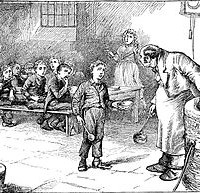This is part of my continuing series on "How" to build a community-focused arts organization. An early step is organizing a group of "believers" who can work to generate enthusiasm and support for a transition. For lack of a better term, I call this an engagement working group. The means by which potential members of such a group “find” each other can be as varied as are organizations. Some individuals probably already are aware of like-minded … [Read more...]
Getting to “Us”
I have commented before on the habit of mind in the arts world that separates "us" and "them," especially with respect to our communities. Most directly, in Want-Need: "Them"? I suggested that: [W]e need to see our constituencies (and potential constituencies) not as "them." We need to understand that, together, we are all "us" in the application of the arts to make all our lives better. This requires humility (Humilité, Discovering … [Read more...]
Magnets and Oysters
One issue that every arts organization seeking to engage with its communities must address is the "where" of arts activity. Our unconscious assumption is that art needs to take place in spaces specially designed for the form in question: concert halls, theaters, museums. But just as people unfamiliar with the work we present are intimidated by it, many are reticent to enter the venues to which we have grown accustomed. Of course there are … [Read more...]
Plan B
In the context of posts that write themselves, this one falls in the category of "written (primarily) by someone else." The Guardian (London) published, earlier this year, an opinion piece titled "Public arts funding: towards plan B." (It was written by Three Johns and Shelagh: John Holden, John Kieffer, John Newbigin and Shelagh Wright.) The article is a critique of Arts Council England's arts funding report titled Towards Plan A, a report they … [Read more...]
First, Believe
There is one, and only one, first principle in effective engagement with communities. That is believing engagement is a good thing–for the organization, for the community, and for art. Pragmatic rationales (e.g., "The funder made me do it." or "We need to sell more tickets.") are not unimportant, but in the end they do not move the mission focus of the organization away from internally focused artcentricity. Effective engagement demands that … [Read more...]
Yep, We Do That
In But . . . How? I mentioned that I often am confronted with two vastly different "realities" with respect to arts organizations' commitment to community engagement. High ranking officials will say that commitments to community are deep and wide while others (often education staff) describe their organization's work as arts business as usual–focused almost exclusively on the art. Actually, on more than one occasion I've been faced with tears … [Read more...]
Call for Stories
In advocating for community engagement work, one of the most important elements is identifying and sharing stories of examples of what works (and of projects that could have been improved). For years, the Community Arts Network (CAN) was a great source of such stories. Unfortunately they had to close up shop. Fortunately, the good work they did is still accessible in an online archive sponsored by Indiana University. (This is not just stories but … [Read more...]
But . . . How?
Over two and a half years ago, I began this blog as a means of advocacy for community engagement on the part of arts organizations. While that's not been the sole topic of the posts, it has dominated. I am now beginning a new phase of my work (to which I have alluded before) in which I will try to be somewhat more practical–focusing on the process of helping arts organizations transition to a more community-focused way of being. When I do … [Read more...]
Civic Footprint
Last week I mentioned that I had participated in the 2014 Canadian Arts Summit in Banff. While there I learned many things about both the arts generally and the arts in Canada specifically. (Our neighbors to the north seem to have things well in hand.) However, one concept in particular leapt out at me. In a session someone mentioned the idea of tracking an organization's "civic footprint." (I think this came from someone in a tabletop … [Read more...]
More? You Want More?!!
There is an iconic scene in the musical Oliver in which the young orphan Oliver Twist approaches Mr. Bumble, the workhouse supervisor, and asks for a second bowl of gruel. Bumble's enraged reaction is "More! You want more?!!" In his mind, the little whippersnapper had unmitigated gall to request seconds. The firsts were more than generous. This, of course, put me in mind of fundraising. (While my mind may not have only one track, the number is … [Read more...]










